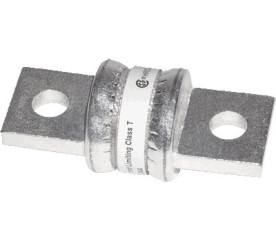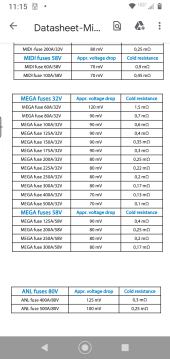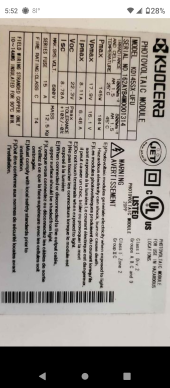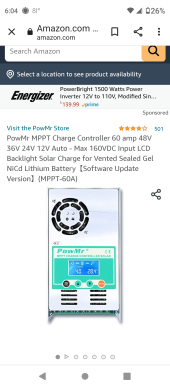I am in Texas too, this is what I started out with. I started off with 4 - 305 watt panels, 1-40 amp solar controller, 4 - 100 ah hour batteries and a 4000 watt pure sine wave inverter. Without battery cost, I had appx $1400 in the setup. It powered my lighting, tv's, ceiling fans and fridge. Since then I have almost tripled my system including heating my water. Good luck-it may become an addiction. There is a guy in ft wort that I buy used panels from. 435 watt at $180 each. In the past he did have 305 watt at $85 each but he is out of those. I have 2-24 volt systems.
You are using an out of date browser. It may not display this or other websites correctly.
You should upgrade or use an alternative browser.
You should upgrade or use an alternative browser.
Thinking about small solar backup system in South Texas..48 or 24 vdc?
- Thread starter DonPBall
- Start date
Nobodybusiness
Collecting the leftovers of the Great Sky Reactor.
Personally I would go with 48v. Half the current and half the cost of copper cables.So after last Winters debacle down here when the power was out for almost 3 days and the temp got down to 25 degrees about 10 miles from Mexico, I am looking into using the batteries in our golf cart as the battery pack for an inverter to power the refrigerator. The house fridge is 6.5a, but just got a mini fridge rated at 1.1a which might be a better option.
The cart is 48vdc (6 8vdc brand new deep cycle batteries) The batteries are rated at 150 (20hr) 120 (5hr). Thinking of purchasing a decent not too expensive inverter 2000-3000w.
First question: What input voltage inverter....48 or 24 vdc? I could reconnect the batteries to obtain 24 vdc, but would this get me more or less run time? I know the wiring would need to be larger to the inverter with 24vdc. I don't think you can run a 12vdc inverter from 16vdc battery pack and the wiring is again even larger?
Second question: considering some type of portable solar charging system. To charge a 48vdc battery pack I think I would need something like 5 or 6 panels. That's too many to set up temporarily and nowhere to store them. I think the 24vdc system would only need 2-3 panels maybe? Also the charge controller might be cheaper?
i know these subjects must have been discussed here before but I could not find what I was looking for. Thank you for taking the time to read this and possibly supplying more info.
True of an actual stand-alone inverter. But for those with an all-in-one (AIO) or an inverter/charger it would be bidirectional.Some are polarized, which should be OK for battery to inverter (not bidirectional)
I checked on Victron's website, but can can only see 100 or 125A 58V, or 400A 80V. None of these seem to be the right one for my project. I am about to give up on this part of the project and just rely on the fuses built into the inverter, which hopefully will never need to be used.Breakers only go so high in amperage before they start to get stupid expensive. At that point, most people switch to fuses. I'm using a MEGA fuse on my inverter. It's what Victron has in their diagrams, so I'm going with that.
Attachments
Victron uses the ANL fuses immediately downstream of the battery and the MEGA fuses just before the inverter. Neither type of fuse is in the same class of a Class T fuse, which is rated up to 160 volts and 400 amps. I'm using a Class T fuse immediately downstream of my battery. I have a 12 volt system, so things are a bit easier at that voltage.


Hedges
I See Electromagnetic Fields!
- Joined
- Mar 28, 2020
- Messages
- 20,678
6.5A is defrost heater or heater to release cubes from ice maker, not compressor. It only runs occasionally. More total consumption but you should be able to start & run it with the 2500W 48V inverter you're considering. "Pure sine wave" is good.So after last Winters debacle down here when the power was out for almost 3 days and the temp got down to 25 degrees about 10 miles from Mexico, I am looking into using the batteries in our golf cart as the battery pack for an inverter to power the refrigerator. The house fridge is 6.5a, but just got a mini fridge rated at 1.1a which might be a better option.
2500W/40V/90%*1.12*1.25 = 97A
40V is low lead-acid battery
90% is (generous) efficiency
1.12 is ripple factor; current from battery supplying AC inverter has lots of ripple
1.25 margin to avoid nuisance trips due to hot weather or cables heating fuse/breaker
A 100A slow-blow fuse or breaker would be appropriate.
WYtreasure
It's not happy hour, I'm just like this.
Apologies to the OP but I can't find a 160 amp Class T fuse and block that works in the 100 VDC range, to save my life.
Any suggestions?
Any suggestions?
Apologies to the OP but I can't find a 160 amp Class T fuse and block that works in the 100 VDC range, to save my life.
Any suggestions?
The closest Class T fuse from Blue Sea is the 200 amp fuse. Why are you looking for a fuse for 160 amps and 100 volts?
WYtreasure
It's not happy hour, I'm just like this.
I'm not smart enough to say I need a 100 volt fuse.The closest Class T fuse from Blue Sea is the 200 amp fuse. Why are you looking for a fuse for 160 amps and 100 volts?
Have 2 12 volt, 200 Ah lifepo4 batteries, 24 volt system (in process) and my silly all in one charge controller/inverter wants 160a fuse/breaker between it and the batteries.
Studied others advice and did quite a bit of reading in the resources section. Came to realize that is what a Class T fuse is designed for. I think.
Like I said in post #25, Victron has MEGA fuses between the common bus bar and the inverter. The more expensive Class T fuse is used between the battery and the bus bar. There may be other sources for the Class T fuse that goes down to 160 amps, but Blue Sea only goes down to 200 amps. Cooper Bussman produces circuit breakers up to 200 amps. The next lowest is 150 amps however.
Battery (Pos) -> Class T Fuse -> Master Switch -> Common Bus Bar (Pos) -> MEGA Fuse (or breaker) -> Inverter
Battery (Neg) -> Shunt -> Common Bus Bar (Neg) -> Inverter
Battery (Pos) -> Class T Fuse -> Master Switch -> Common Bus Bar (Pos) -> MEGA Fuse (or breaker) -> Inverter
Battery (Neg) -> Shunt -> Common Bus Bar (Neg) -> Inverter
WYtreasure
It's not happy hour, I'm just like this.
Read that, visited the site and many others, learned how CBs can't react fast enough to the massive dump of lifepo4. Everywhere I look they are out of stock or do not make 160A Class T.Like I said in post #25, Victron has MEGA fuses between the common bus bar and the inverter. The more expensive Class T fuse is used between the battery and the bus bar. There may be other sources for the Class T fuse that goes down to 160 amps, but Blue Sea only goes down to 200 amps. Cooper Bussman produces circuit breakers up to 200 amps. The next lowest is 150 amps however.
Battery (Pos) -> Class T Fuse -> Master Switch -> Common Bus Bar (Pos) -> MEGA Fuse (or breaker) -> Inverter
Battery (Neg) -> Shunt -> Common Bus Bar (Neg) -> Inverter
I may end up with 150A and I'll be happy.
Thanks
Edit: donrowe is shipping 150a Class T fuse today.
Last edited:
Plug in t class fuses are available down to 1/4 amp
WYtreasure
It's not happy hour, I'm just like this.
Don't want to hijack.Plug in t class fuses are available down to 1/4 amp
I'm

Boss Lady says learn on the PowMr 3k inverter/charger + 8 100w panels or it's COAL in my stocking
That is a handy thing to have , years ago I would touch them to see if they are hot . I hammer punch my lugs, up to 4/0. Twist cable, slide in , beat it with a mini sledge as if it assaulted your daughter in the night, then flood with electric solder warming with propane torch, then heat...
BayMarineSupply.com is where I get a few of my supplies. They have the Class T fuses and fuse holders in stock. They also sell the ANL and MEGA fuses.
Ok still in the process of obtaining the fuse. In the mean time I found 2 solar panels that I might buy locally. They are Kyocera 145w...asking $100 each.
Also found a Renogy Controller relatively cheap. Any comments appreciated.
Also found a Renogy Controller relatively cheap. Any comments appreciated.
Attachments
That PowMr is a bit overkill for those two panels. But if you think you'll add more panels, it has room for that.
Thanks! Just considering it because it can work with the 48vdc battery bank. Some of the cheaper ones do not list this capability. Any recommendations?That PowMr is a bit overkill for those two panels. But if you think you'll add more panels, it has room for that.
Thanks! Just considering it because it can work with the 48vdc battery bank. Some of the cheaper ones do not list this capability. Any recommendations?
I'm partial to Victron Energy MPPT products. But I've had a GoPower PWM controller working like a dog in my RV for four years without a hiccup.
Hedges
I See Electromagnetic Fields!
- Joined
- Mar 28, 2020
- Messages
- 20,678
When choosing an SCC, consider PV panel specs and future array configurations, series/parallel. Calculate elevated Voc in record coldest temperature for your location.
Other popular SCC including Victron, Epever, Midnight. Some integrate by datacom with various hardware. Some have more configurability for various lead-acid and lithium chemistries.
Higher Voc rated SCC let you use higher voltage PV strings, good for long wire runs and allows smaller gauge wire. Cost per watt is higher, and efficiency of SCC is lower but loss in wire is reduced.
Other popular SCC including Victron, Epever, Midnight. Some integrate by datacom with various hardware. Some have more configurability for various lead-acid and lithium chemistries.
Higher Voc rated SCC let you use higher voltage PV strings, good for long wire runs and allows smaller gauge wire. Cost per watt is higher, and efficiency of SCC is lower but loss in wire is reduced.
WYtreasure
It's not happy hour, I'm just like this.
Consider how large your system may grow.Thanks! Just considering it because it can work with the 48vdc battery bank. Some of the cheaper ones do not list this capability. Any recommendations?
Dig deep into the specs.
Look very closely at Breakers, Shutoff switches, Fuses and other smaller parts.
Many of the products which look "OK" at first glance, are not.
Interesting discussion over here: https://diysolarforum.com/threads/battery-disconnect-for-nominal-48v-systems.32915/
Similar threads
- Replies
- 10
- Views
- 399
- Replies
- 7
- Views
- 170
- Replies
- 4
- Views
- 219





